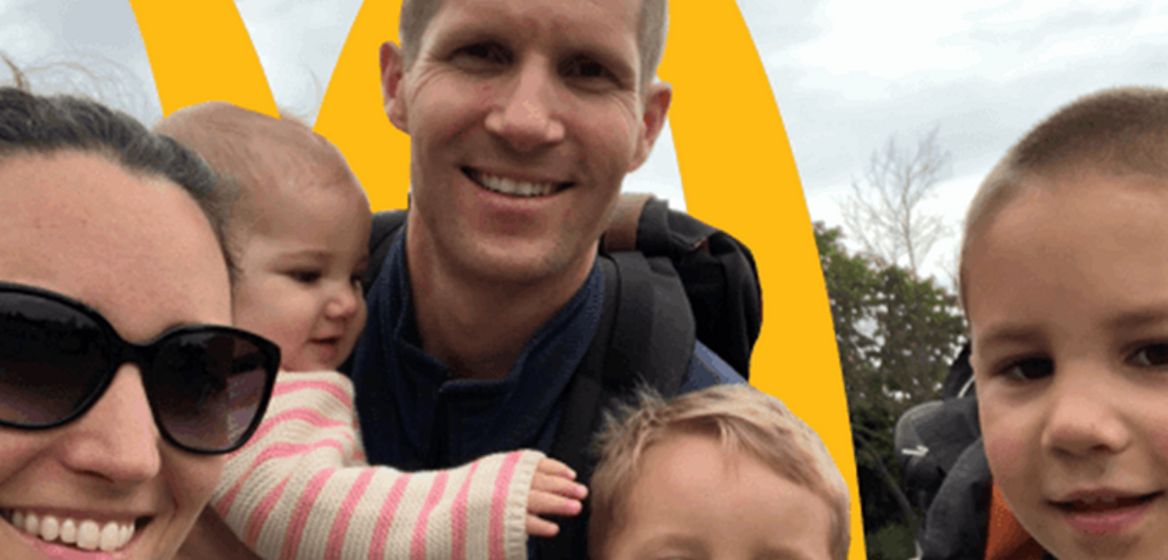After Serving in the Military, He Found Purpose at McDonald’s
January 01, 2019
“I think one of the biggest misconceptions about veterans entering the civilian workforce is that the skills are non-transferable,” said Patrick Collins, Army veteran and Strategic Sourcing Manager. “Vets are leaders, they’re amazing at operations, they can think on their feet and they genuinely care about people and developing talent,” he said. In other words, the skills you gain in the military directly transfer into the workforce.
So, after two year-long tours in Iraq and five years in the military, Patrick wasn’t really worried about useable experience for corporate jobs. What did keep him up at night, though?
He questioned if he could ever find the sense of purpose in the corporate world that he felt in the military.
In the military Patrick understood how his individual role enabled the broader mission, the impact he had on the people in his unit and the tangible results of his work. He wondered if he would have to give all of that up for a paycheck.
He quickly discovered that fear was unfounded at McDonald's – which wasn’t the case at other organizations.
Patrick believes he found purpose at McDonald’s for the same reasons he did in the military: Good people, a sense of value added and a focus on family.
“Good people” is a term Patrick comes back to a lot. It’s woven through his story, from his time as an Officer in the Army to strategic sourcing here at McD’s, and eventually to the Veterans Business Network, where he is a co-lead. “It doesn’t matter what your role is, the basic need is the same. It’s about valuing and uplifting the people you work with,” he said.
McDonald's genuinely values its people. Everyone wants to feel respected and believe that their sacrifices and effort are of value, and I feel that here.
And when it comes to attracting good people to McDonald’s, Patrick feels it’s essential that vets are included in that search.
As with other diversity and inclusion efforts, allowing the potential of veterans to go untapped would be a huge miss for our organization, and Patrick and the Veteran’s Business Network want to make sure that doesn’t happen by attracting vets who provide tremendous value once they’re here.
We want to attract vets – and keep them here.
When it comes to attracting veterans, Patrick is a pretty fantastic corporate candidate. Think: Pedigreed education from West Point, proven leadership skills and success in the military. But what about the men and women who enlist out of high school with no college education. Do they have a place at McDonald’s?
“Let’s put it this way,” Patrick started. “There is someone with a Literature degree on my team who is responsible for driving aspects of the sourcing strategy. On paper, that discipline may not seem directly tied to our work, but we immensely value their unique perspective and we’re a better, more innovative and effective team because of it.”
He argues the same perspective should be used when evaluating veteran job candidates. “Depending on the position, I would value the perspective and unique skill set of a veteran with 10 years in the military and no college degree just as much,” he said.
It’s about non-veterans, too...
Reinforcing the value of military work within a corporate setting is another big goal for Patrick and the Veteran’s Business Network.
Essentially, we're trying to de-mystify the military for non-vets and show the direct connection between military experience and the business world.
Operations expertise, team leadership and out-of-the-box thinking are just a few of the unique and applicable skills that translate directly to the business world and here at McDonald’s.
We want to make sure that value is recognized by a veteran’s managers and teammates.
“Hollywood hasn’t done us many favors. Most of the time, people don’t understand what it means to have served,” Patrick explained. “Most veterans don’t need or want a pat on the back. They want to work hard and feel appreciated for that work they’re doing now.” Their military service is likely a formative experience but it shouldn’t and doesn’t define them.
And that starts with getting to know them the way you would any other person.
He explained that rather than a canned “Thank you for your service,” a more appropriate response might be “How was your time in service?” or other questions that seek to better understand the experience and how it continues to shape their lives and decisions. This creates a dialogue, de-mystifying the role of military work in people’s lives and making veterans feel there is a place for them when they come home after deployment.
McDonald’s and the military are family-focused.
Family is a core value at McDonald’s and it’s one of the greatest touchstones between Patrick’s job here and his time in the military.
Patrick emphasized that often the ones who make the hardest sacrifices are the families who are left behind during deployment. He’s eager to create opportunities and activities for families of vets and families of McDonald’s employees who are currently deployed. “These activities have not been defined yet, but the spirit should be to remind these families that we’re thinking about them, we appreciate their sacrifice – only the veterans get ‘thank you for your service’ comments – and that they’re always welcome here,” he said.
This is all part of our goal to make McDonald’s a great place for veterans and their families.
"And ultimately, the business thrives when we are making McDonald’s a place for the very best talent from every background,” Patrick said.
He’s laying the groundwork for a more inclusive workforce, which at the end of the day is all about purpose.
Deep down, people want to feel valued and they want a sense of purpose. That's something you get inherently from being in the military and it's something we can provide here at McDonald's.

